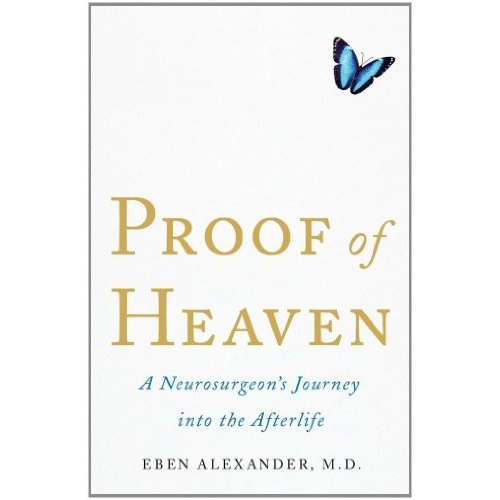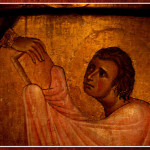We run our website the way we wished the whole internet worked: we provide high quality original content with no ads. We are funded solely by your direct support. Please consider supporting this project.

Review of Proof of Heaven (Eben Alexander)
Proof of Heaven is a recently released book by Eben Alexander that is receiving a lot of acclaim. In this review I’d like to first provide a general overview of Proof of Heaven and then analyze it from a theological perspective.
——- An Overview ——-
A friend told me about Proof of Heaven several weeks ago after hearing about it on a T.V. talk show. What initially intrigued me about this book was that this Near Death Experience (NDE) account was from a reputable neurosurgeon (Eben Alexander) who had inexplicably contracted an extremely rare form of bacterial meningitis that literally eats the brain, beginning with the neo-cortex. In Alexander’s case, it completely shut down his neo-cortex and sent him into a near brain-dead seven-day coma.
Less than one in ten million adults contract bacterial meningitis, and the majority of these die. The few who survive usually remain in a near vegetative state the rest of their life. And never in history, according to this book, has someone remained in a coma for over four days and lived. Alexander came out of his coma after seven days, and he eventually made a full recovery of his mental capacities. His survival is nothing short of miraculous, as Alexander himself testifies.
The story of his survival is compelling in and of itself, but what makes Alexander’s NDE particularly compelling is that the neo-cortex is the part of the brain that is responsible for all our thoughts, emotions and everything that makes us distinctly human. Alexander argues that the fact that his neo-cortex was 100% inactivated — a fact that was closely monitored in a hospital setting — means that his experiences while in a coma cannot be explained as a dream or hallucination or any other mental phenomenon.
It wasn’t primarily the credibility of this account that inspired me to buy this book, however. What really grabbed me was that the above-mentioned friend introduced me to a pre-publication on-line excerpt from this book. I was immediately captivated by the beautiful picture of “the other world” expressed in this four-page excerpt and was impressed by the remarkably detailed prose used to express it. On top of this, I sensed that this book was going to be a hit, which meant that I would probably receive a multitude of questions about it. This practical consideration, combined with the credibility and quality of this work, motivated me to order the book, which was to be published two days later.
The first thing I’ll say about Proof of Heaven is that Alexander is a great storyteller. The book progresses by masterfully shifting back and forth between experiences that Alexander was having in what he believes was the after-life, on the one hand, and what was going on in his physical environment while he layed on the hospital bed in a coma. Throughout the narrative Alexander sprinkles in clinical insights from his background in science. The clash between his rational, objective, scientific observations, on the one hand, with the wild, mystical-sounding world he was experiencing in his coma, on the other, gives his narrative a unique, sci-fi, almost surrealistic quality.
As he shifts back and forth, Alexander artfully weaves in stories about his life leading up to his coma that helps readers become more emotionally invested in his account and that actually end up adding to its credibility. In fact, Proof of Heaven is almost as much an autobiography, leading to a rather poignant climax, as it is an account of an NDE.
The reality that Alexander experienced while in a coma was as bizarre as it was beautiful. I’ll share one scene. Early in his travels (for lack of a better word), Alexander discovered that he “wasn’t alone.” He writes:
Someone was next to me: a beautiful girl with high cheek bones and deep blue eyes….We were riding along together on an intricately patterned surface, alive with indescribable and vivid colors – the wing of a butterfly. In fact, millions of butterflies were all around us – vast fluttering waves of them, dipping down into the greenery and coming back up around us again… [The girl] looked at me with a look that, if you saw it for a few moments, would make your whole life up to that point worth living, no matter what had happened in it so far. It was not a romantic look. It was not a look of friendship. It was a look that was somehow beyond these…beyond all the different types of love we have down here on earth. It was something higher, holding all those other kinds of love within itself while at the same time being more genuine and pure than all of them (40).
Without giving anything away, I’ll simply note that this radiant girl ends up playing an important, poignant role in Alexander’s life after he came out of his coma. The above description of his experience of this girl is reflective of a quality that permeates his entire account of the after-life. Alexander continually strains to express a transcendent reality that he acknowledges can never be adequately expressed. Yet, I felt that he succeeded in giving me a sense of what he experienced. Similar to what I feel when I read some of C. S. Lewis’s fiction, I felt like I was being given a glimpse of a world I on a profound, subterranean level already intuit, but that is always just beyond my ability to identify or understand. In fact, there is a mystical quality that permeates Alexander’s description of the world he experienced, and this was, for me, the most enjoyable part of this book.
——- A Theological Assessment ———
Since I’m a theologian, I’d like to spend the remainder of this review discussing the theology that is presupposed in Alexander’s purported experience of the after-life.
To begin, I was happy to find that Alexander experienced a God who is unfathomably beautiful and deeply personal while also being infinitely beyond anything we can imagine, conceive or articulate. In other words, Alexander experienced a God whose infinite transcendence doesn’t make him less personal than we are: it makes him infinitely more personal. Since I assess everything pertaining to theology through the lens of Jesus Christ, and since this description of God is consistent with the God revealed in Christ, I accept this aspect of Alexander’s experience as valid.
Closely related to this, Alexander experienced a God whose perfect love defined and united all things but who wasn’t simply identical to all things. So too, while he felt perfectly united with God, Alexander knew he “could not become entirely one with the creative, originative drive of all that is,” otherwise his own individuality would be abolished. Curiously, Alexander identifies the God he experienced as “OM,” though he seems to be unaware that this “name” is associated with a Hindu concept of pantheism. Yet, his experience of God while in a coma was not pantheistic. He rather learned that there would always be a certain sort of “duality” in “heaven,” though in “heaven” this duality would no longer be an obstacle to loving unity. It seems to me that this loving unity-in-diversity beautifully captures the sort of thing we’re led to believe is true of heaven in Scripture.
There were a number of other aspects of Alexander’s experience while in a coma that I would deem accurate as well. For example, I was delighted with Alexander’s beautiful description of the angelic beings he encountered in his travels to the other world. Nothing about his encounters with these strangely beautiful beings was inconsistent with what I’ve learned about angels in Scripture. I was happy as well to find that Alexander, who was not a deeply spiritual man prior to his NDE experience, discovered in his travels that prayer plays an important role by influencing what goes on in heaven and on earth.
I was particular excited to find Alexander’s experience of what he believed was the after-life confirmed that free will is essential for our capacity to love and to be morally responsible. So too, Alexander’s otherworldly experience taught him that all that is wrong with the world is ultimately due to the misuse of free will, not God. Having said that, there are two lines in this book that make it sound like evil is a necessary feature of any world that contains free will. But given that Alexander is not a theologian, these lines may reflect his imprecise way of making a theological point.
The only other thing I’d add in terms of a positive assessment of Alexander’s experience of what he called “heaven” is that the unfathomable beauty of this realm that he strains language to point us toward is generally consistent with the beautiful vision we’re given in Scripture. It’s a realm in which the love of God permeates and unifies all things and thus a realm in which we experience a profound connection of love with everyone and everything we encounter. As I said above, it’s a realm in which everything will be perfectly united in God’s love without losing their individual distinctness. It’s a realm in which we are no longer self-centered and estranged from one another or from other things, which is why it’s a realm in which we no longer have to rely on words to communicate. Without endorsing the particular details of his lucid recounting of his experience, the heart of his magnificent vision of a realm defined by love is one with the heart of the vision given us in Scripture.
At the same time, there are several aspects of Alexander’s experience that strikes me as being at odds with Christian teaching. Five things stand out as particularly important.
First, Alexander never encountered Jesus in his otherworldly travels. After Alexander came out of his coma, he tells us that he was reminded of his intimate communion with God while in a coma as he took communion in church and thought of Jesus’ sacrifice. But so far as we’re told, Jesus wasn’t part of the experience itself.
Now, given that we possess no reliable information about what happens to people immediately after death, the absence of Jesus in Alexander’s experience doesn’t necessarily invalidate it. For all we know, for example, it may be that Jesus was present in his experience but not in a way that Alexander was ready to recognize. Or it may be that God allows a person’s initial experience of the after-life to be conditioned by their own beliefs and expectations – a point that may explain why many (but not all) who have near death experiences discover a realm that more or less conforms to what they already believed. In any case, the absence of Jesus in Alexander’s experience is worth noting.
Second, whatever else we might say about Alexander’s experience, from a biblical perspective, it was most certainly not an experience of “heaven.” Scripture consistently depicts our final state – “heaven” – as being an embodied state, and our dwelling place as earth. The hope of heaven that we’re given in Scripture is not that our souls survive the death of our bodies. It’s that our bodies will be resurrected at the end of the age. After this resurrection, we are told, we will reign with Christ on “a new heaven and a new earth.” (An excellent book on this topic, by the way, is N.T. Wrights, Surprised by Hope.)
Now, this also doesn’t necessarily invalidate Alexander’s experience, for while the hope of the New Testament is always focused on the resurrection, most scholars agree there are a few passages that suggest we continue to survive in a conscious, disembodied state between our death and the resurrection (e.g. 2 Cor. 5:1-8; Phil 1:21-23). There is also an increasing amount of empirical evidence from NDE’s that some people remain conscious in a disembodied state after death (e.g. J. Long, P. Perry, Evidence of the Afterlife: The Science of Near-Death Experiences). In this light, it may simply be the case that Alexander mistakenly identified this intermediate state as “heaven.” If so, it would entail that as magnificent as Alexander’s experience was, it was actually just a prelude to the real heaven. When God’s kingdom is come in fullness, it will outshine even the glorious reality of what Alexander experienced!
Third – and this is, I believe, the most serious objection to Alexander’s account — there were three statements that Alexander was given in his after-life experience that he feels he is supposed to now proclaim to the world: “You are loved and cherished;” “You have nothing to fear;” and “There is nothing you can do wrong.” For obvious reasons, the third one concerns me. Indeed, it strikes me as utterly absurd. I have trouble believing that Alexander believes that if someone raped his child, for example, it wouldn’t be “wrong.” But though I’ve tried to think of ways to interpret this statement such that it wouldn’t imply this, I have so far failed. If a divine agent gave this teaching to Alexander with the meaning that there is no such thing as evil and sin, then I have no choice but to conclude that this agent was demonic.
Fourth, toward the end Alexander tries to integrate his experience of the after-life into a theory of consciousness as well as into current scientific discoveries, especially from quantum physics. This was a very interesting part of the book, and I personally agree with most of it. For example, I concur with Alexander in thinking that consciousness not only exists apart from matter, but that it is a more fundamental reality than matter. And I affirm his view that quantum physics demonstrates that everything is “entangled” with everything else. In fact, this is not so much a matter of Alexander’s opinion as it is a scientific fact. While current science doesn’t collapse everything into everything else, it does undeniably suggest that the line between me and you and everything else is not absolute. There is a very real sense in which everything is part of one united whole.
At the same time, Alexander pushes this truth in a direction that is, for lack of a better word, “New Age-ish.” For example, he speaks of the universe as if it was as eternal as God, if not an eternal aspect of God (156). So too, he sometimes talks in ways that sound like our “true self” is an aspect of God (though I want to be gracious in acknowledging that Alexander, who has no training in theology, may just be speaking in a indecorous manner). And Alexander crosses a line that most Christians will feel uncomfortable with when he seems to give a whole scale endorsement to parapsychology, including things like psychokinesis, clairvoyance, telepathy and precognition. I am not among those who completely dismiss these phenomena or who think they’re necessarily demonic. But I do believe one has to exercise great caution surrounding phenomenon like this.
Finally, while Alexander emphasizes free will, as I said above, he also at times falls into what I have elsewhere called “blueprint” ways of thinking (see my God at War). For example, he several times says that he believes his coma happened “for a reason,” which was to make him living “proof” that heaven is real, to help people see that they are unconditionally loved, they have nothing to fear and (gulp) they can do nothing wrong. Several other times he talks in ways that suggest that nothing happens by accident and that there is a “reason” – presumably, a divine reason, behind everything.
Anyone who knows my work will not be surprised to hear me state that I vehemently oppose this line of thought on both biblical and philosophical grounds. Among other things, it implies that everything is unfolding according to God’s plan, which in turn implies that God is ultimately behind every tragedy that takes place, whether good or evil. This, in fact, would make sense of Alexander’s misbelief that we “can do nothing wrong,” for if all we do conforms to God’s plan, and if God is perfectly good, then everything we do must ultimately be good! I, for one, would not want to say that the Holocaust or any other demonic event in history was in any sense “good.”
—–Conclusion——-
So what do I make of Alexander’s experience? Was it a bona fide experience of the after life? To be honest, I don’t know. If it was, I have to conclude that Alexander simply got some parts of it wrong. All of our encounters with God are mediated by our fallible minds, so it wouldn’t be surprising if Alexander’s was partly mistaken.
Conversely, though Alexander adamantly denies this possibility, Alexander’s travels into what he thought was the after life might have merely been a mental phenomenon. While the absence of any activity in the neo-cortex region of his brain rules out his experience being a dream or hallucination, it doesn’t conclusively rule out a thing known as the “reboot phenomenon” (Alexander discusses this on 142-43). That is, as Alexander was regaining his consciousness, his mind might have created this experience as a way of imposing an intelligible narrative on otherwise disjointed memories and sensations. Many specialists in the field of dreams contend that this is how dreams are constructed. And while the dream may feel like it took place over a long period of time, it actually was pieced together in a matter of seconds as a person was waking up. Alexander’s refutation of this possibility relies heavily on how real and lucid and detailed his experience was, but that is too subjective to be considered a strong refutation.
Whatever we make of this or any other NDE, the hope of all followers of Jesus doesn’t concern what happens immediately after death. It rather concerns what will happen at the end of the age, when our bodies will be raised, when all that is inconsistent with the loving character of God will be burned away, and when we and the entire cosmos will finally be what God has always intended: mirrors of his perfect, unending, triune love. And the basis of that hope is not someone’s account of what happened when they went into a coma or died. The basis for that hope is the resurrection of Jesus.
Category: General
Tags: Book Reviews, Heaven, Proof of Heaven
Related Reading

What Have You Been Reading Lately? (podcast)
Does God suffer? Should we learn to swim? Drumming, books, magazines and more! Episode 586 http://traffic.libsyn.com/askgregboyd/Episode_0586.mp3

Part 17 (of 20)- Jordan Peterson on God
Assessing Jordan Peterson’s 12 Rules of Life “God, whoever or whatever he may be, is no simple granter of wishes.” Jordan Peterson In this post I would like to review and evaluate what Peterson has to say about God and in the following post I will do the same for what Peterson has to say…

Part 3: Disarming Flood’s Inadequate Conception of Biblical Authority
Image by Ex-InTransit via Flickr In this third part of my review of Derek Flood’s Disarming Scripture I will offer a critique of his redefined conception of biblical inspiration and authority. I will begin by having us recall from Part I that Flood holds up “faithful questioning” over “unquestioning obedience” as the kind of faith that Jesus…

Part 20 (of 20) — Peterson’s Appeal
Assessing Peterson’s 12 Rules of Life Four months ago a young woman approached me after a church service, handed me 12 Rules of Life while saying, “You really needed to know what this guy is saying.” I’m so glad she did! To be frank, given the buzz I’d heard about Peterson throughout the previous year,…

Eckhart Tolle’s “A New Earth”: A Review
A New Earth, written by Eckhart Tolle, has become an overnight sensation thanks largely to Oprah’s enthusiastic endorsement. In fact, Oprah hosted a 10-week on-line course conducted by Tolle that included over two million students. Given all the publicity this generated, I decided I needed to give the book a read. Here’s my review. Insights…

Part 8 (of 15): Race and Social Hierarchies
Assessing Jordan Peterson’s 12 Rules for Life by Greg Boyd “The degree to which the terrible part of the world manifests itself in your life is proportionate to how insufficient you are….If you got your act together completely, maybe all the suffering would disappear from your life, or at least all the unbearable suffering.” Jordan…
